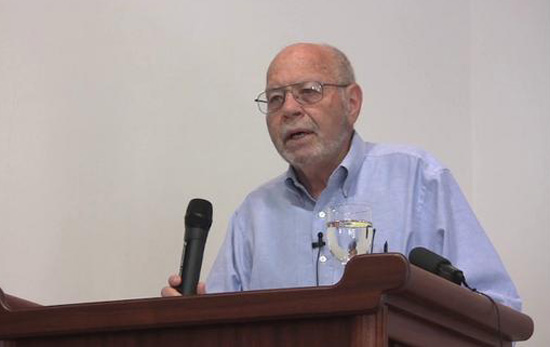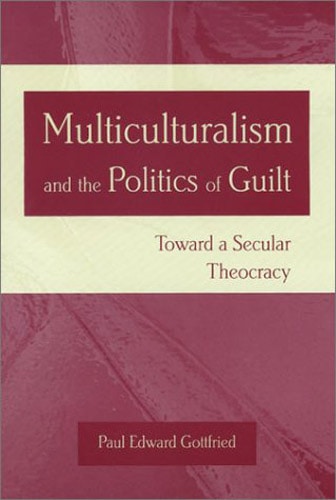Not a Prophet in His Own Land
Hubert Collins, American Renaissance, April 27, 2018
Professor Paul Gottfried is one of the most brilliant intellectuals in America today. The author of 13 books and thousands of essays and articles, it is difficult to summarize his broad body of work, but his influence is great. His intellectual fingerprints are all over the work of the dissident movement’s better known names: Peter Brimelow, John Derbyshire, Sam Francis, Alexander Hart, Gregory Hood, James Kirkpatrick, Chris Roberts, Richard Spencer, and Jared Taylor, among others. If you are unfamiliar with his work, I cannot recommend it more highly — I have now read seven of his books. There is no better way to understand the evolution of the Left in the last half century or the history of conservatism in America.

Paul Gottfried
Paul Gottfried is a former professor of humanities at Elizabethtown College in Pennsylvania. In this interview, he talks about his own intellectual influences, religion, President Trump, and more.
What are your religious beliefs? Do you attend synagogue?
Yes, I do attend services in a small community near Elizabethtown and even read from the sacred scroll (Torah) on the High Holy Holidays. I’m also attracted to the Pauline Epistles and find much in the New Testament that is worthy of admiration, including the parables of Jesus. I do not share the anti-Christian bias of some members of the Alt-Right and in fact am irresistibly drawn to the Bible, both Testaments.
How many languages are you fluent in? How many can you read?
I read at least ten languages: Biblical Hebrew, classical and demotic Greek, Latin, German, Dutch, French, Italian, Spanish, Romanian, and English. I speak, with varying degrees of fluency, English, German, French, and Italian. I can get by in conversational Hungarian and Polish but Russian is too much of a stretch.
Of the books that you have written, which do you consider the best, or the most important? I suspect Multiculturalism and the Politics of Guilt has made the most impact, at least among dissidents.
My book on multiculturalism may have been my work that most influenced the dissident Right, followed by my study of the post-Marxist Left. But the books that I worked perhaps hardest to write were After Liberalism, Fascism: Career of a Concept, The Search for Historical Meaning, and my angrily received study of Strauss and the Straussians.

Could you name five books that proved the most influential in how you see the world?
It is impossible to single out just five books that affected my thinking because hundreds influenced me, starting with the Bible, Thucydides’ Histories, Hobbes’s Leviathan, Aristotle’s Politics, and most of the great classics of the West. As a writer on German intellectual history, I would have to pick German thinkers, such as Hegel, Weber, Spengler, Nietzsche, Heidegger, Schmitt, and even Marx as the intellectual figures I know best.
You are often credited with being something of an intellectual godfather to the so-called Alt-Right. Whatever name one gives to the movement, your works have certainly proved deeply influential. What do you make of this?
I may be indeed the social and political critic who has proved the most influential for all forms of the dissident Right. The reward I have earned for this association, however, is that no website, press, or magazine associated with Conservatism Inc. will have anything to do with me. They won’t even show me the courtesy of responding to my queries. Book publishers and literary agents drop me as soon as they discover who I am — or who I’m supposed to be. [Editor’s Note: To their credit, The American Conservative and LewRockwell.com still publish Dr. Gottfried.]
Some say that after bursting into American politics in 2016, the Alt-Right is already becoming a sideshow. What do you think?
I think the Alt-Right may be on its way out. It seems deeply divided within its own ranks and in trying to assert itself it used shock tactics that have backfired. Another one of its multiple problems has been its largely futile attempt to substitute shocking interviews and dramatic demonstrations for the work of gathering resources. Without a TV channel that would rival the neocon-subsidized Fox, and a nationally read newspaper and website, no dissident Right can compete with the leftist-neocon media. Ann Coulter and Tucker Carlson, who may be the mainstream conservatives who are most congenial to the dissident Right, are not likely to change sides, given the glaring imbalance of power.
President Donald Trump seems to be becoming just another generic Republican politician. As Steve Bannon put it last August, “The Trump presidency that we fought for, and won, is over.” Other noteworthy populist nationalists (Ann Coulter, Jeff Giesea, et al.) have begun to lose faith in Mr. Trump as well. Do you think?
I have no idea why members of the dissident Right, whether of the Old Right or the Alt-Right ever imagined that they would have the slightest influence on President Trump. These people are certainly not power players and are carefully kept out of the public conversation. Talk about the plight of the unarmed prophet! Mr. Trump may well end up falling between two stools, leaving his populist base feeling betrayed but never winning the support of most of the neocon power brokers and journalists (aka Never Trumpers). The neocons like his foreign policy at the moment but as soon as Trump does something they don’t fancy, they’ll go back to dumping on him. But because of its powerlessness and role as a liberal-neocon punching bag, a more serious Right will not benefit from any of this.
What do you make of the rising popularity of socialism in the US? Bernie Sanders is now the most popular politician in the country. How does this end?
I’m not at all concerned about Senator Sanders or some Republican bugaboo called “socialism.” The evil we face throughout the onetime Western world is the spread of the multicultural poison that has already affected almost equally our two national parties and most of our educational system. This toxin has tainted our media Right almost as much as it has permeated the official left center. Gay marriage is now a “family value” for Jonah Goldberg, John Podhoretz, Greg Gutfeld and other media conservatives. The conservative movement, like the official Left, describes the US as a “propositional nation” committed to the proposition of universal equality and the interchangeability of everyone, providing those pouring into the country are willing to memorize our leftist creed.
A number of years ago, you wrote, “I am a Leninist of the Right. In elections that count, I vote for the most leftist and the most emphatically anti-white candidates. The crazier the better! Let the majority population groan under the added misery until they react. If they don’t, then they fully deserve what they get.” Do you still stand by this statement?
I am still in theory a Leninist of the Right. But in order for this strategy to work, one needs something like a majority or significant minority that can be moved toward a counterrevolutionary stance. Given the dissident Right’s lack of resources, the success of Conservatism Inc. in waging the Left’s battle against any essentialist Right, and the prevalence of Cultural Marxist control over the media, education, and public administration in the US, Canada and Western Europe, I don’t see how a Leninist strategy (la politique du pire) can be made to work at the present time.
What there is of a right-wing mass electorate will continue to fall into the hands of the “conservative movement” either directly or through the capture of populist leaders like President Trump. Leninism of the Right will provide an effective strategy only if the political system and political establishment are overwhelmed by a catastrophe. I suspect Germany and other culturally leftist European countries will reach that state even before we do because of Muslim violence and the unwillingness of their feminized governments to get a handle on this problem or the broader immigration crisis to which it’s related.
Which is your favorite European nationalist and identitarian figure?
My favorite European head of state is Viktor Orban. I am bedazzled by the way he has protected the sovereignty of the Hungarian nation and how he never apologizes for its cultural traditions. Merkel’s Germany, the white South, and Spain, have all moved in the opposite direction. These are societies that have acquired an unhappy taste for collective masochism.
Are there any leftist commentators writing today whom you find insightful? I know you were influenced by leftists in your day, including the late Christopher Lasch, whose work is seeing a bit of a resurgence.
I have respect for the social insights of some traditional Marxists and still read them with profit and appreciation. Unfortunately, the Left is now dominated by advocates of sexual perversion, open borders, and globalist capitalism. It also highlights those who loathe white men, including, strangely enough, white men who hate their own kind.
Any instructive leftists who come to mind?
I used to read Gene Genovese, especially during his Marxist phase, with enormous admiration. I also came to read W.A. Williams through my association with Murray Rothbard, and now take very seriously Williams’s examination of the economic interests sustaining American global political expansion. Although Noam Chomsky seems too reductionist in his examination of the effects of American corporate capitalism in nurturing the war industry, he nonetheless comes up with useful insights about this fateful connection. Also, one can’t ignore the fact that Conservatism Inc. has become financially dependent on “defense industries” as well as on socially liberal Zionists like Paul Singer and Sheldon Adelson.
At one time, I was an ideological determinist of sorts, trying to reduce political behavior to the influence of certain redemptive doctrines, (e.g. Communism or Global Democracy) without considering the socio-economic context in which ideologies developed and how their impact came to be felt. I’ve now moved beyond that perspective.
Your pessimism is notorious. What’s something you are optimistic about?
I would like to believe in Bismarck’s observation that, “God has a special providence for fools, drunkards, and the United States of America.”
[Editor’s note: This short video captures something of Prof. Gottfried’s mordant tone.]















